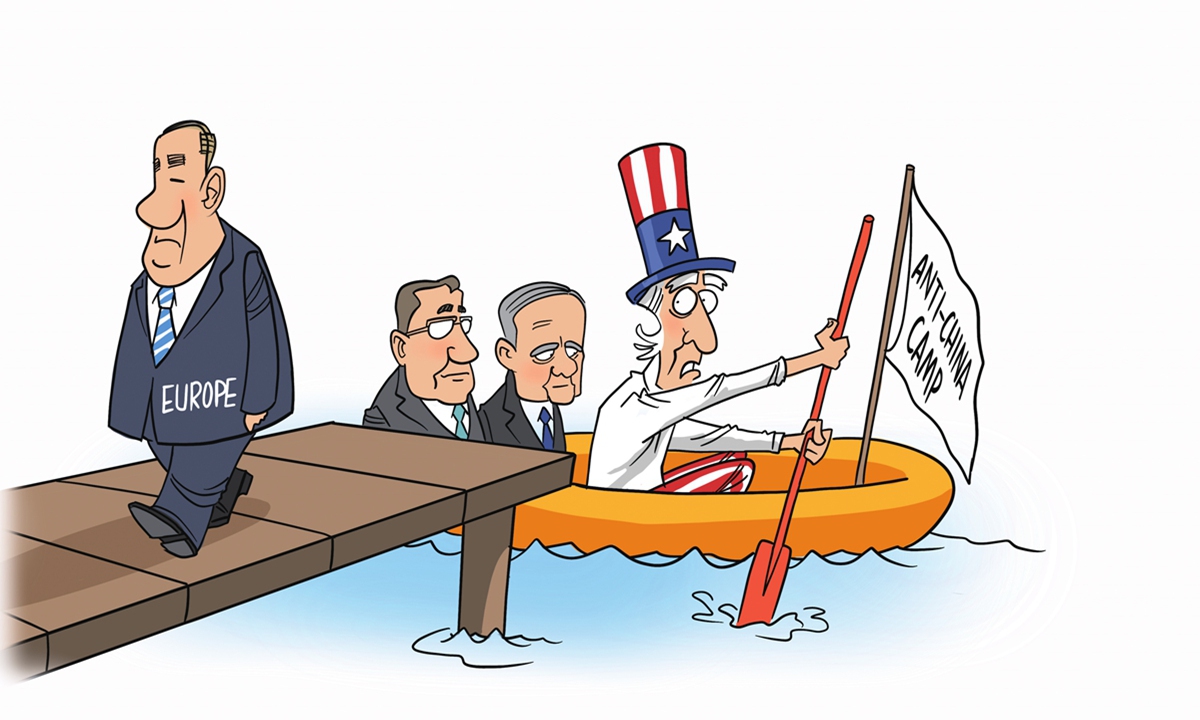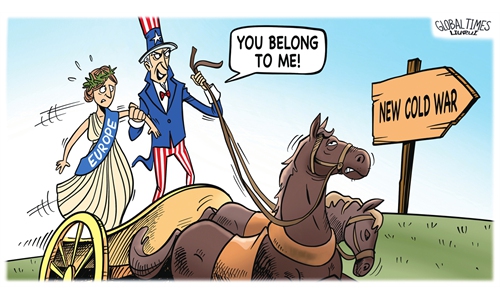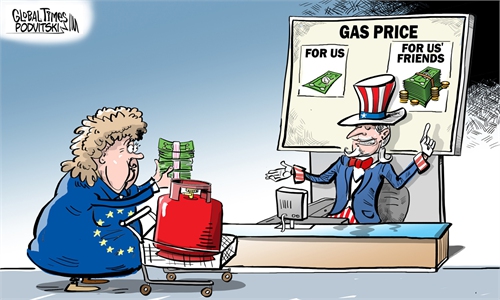
Illustration: Liu Rui/GT
In recent days, major European countries such as Germany and France, as well as the EU, have made intriguing statements on their relations with China and the US. EU trade commissioner Valdis Dombrovskis said at a conference in Berlin on Tuesday that "decoupling" from China is not an option for companies in the EU. He also expressed his "deep concerns" about the US Inflation Reduction Act, arguing that the act discriminates against EU's automotive and renewable energy industries. German Chancellor Olaf Scholz, speaking at the same conference on the same day, said decoupling from China would be a wrong path, and he criticized that US Inflation Reduction Act could trigger "a huge tariff war."The almost unanimous rhetoric reflected a delicate consensus emerging on the European continent, and the signal is positive. Although the official public attitude of Germany and France, including the EU, has always been to oppose "decoupling" and support economic globalization and multilateralism, some people within Europe have stepped up their "decoupling" rhetoric against China under the guise of "reducing dependence." Especially when Washington is pushing toward this direction from the outside, it is both timely and necessary for European leaders to clearly reiterate their positions and attitudes, and to warn of the radical populist trend that is spreading in Europe. To a certain extent, this illustrates that European policymakers have maintained their basic strategic sobriety and rationality in the current complex situation of internal and external challenges.
It is worth noting that while displaying a relatively pragmatic attitude toward China, Germany, France and the EU began to openly express their dissatisfaction with the US. This is not only an active correction to the signs of a recent imbalance in the European diplomacy as a whole, but also a self-awakening after accepting a harsh reality lesson. After the outbreak of the Russia-Ukraine conflict, Europe has become more dependent on the US in terms of security and strategy, and therefore has also lost some of its strategic autonomy. If further going down in this direction, Europe is bound to decline into Washington's geopolitical vassal from a global force. Europe's current passive position is related to its strategic dependence on the US.
But Europe made such a big sacrifice in exchange for what? It is the US profiting from Europe's misfortune. French President Emmanuel Macron recently couldn't help but complain that US gas is too expensive, saying France is "paying four times more than the price you [the US] sell to your industry." According to some media, US companies can earn more than $100 million per container ship of LNG bound for Europe. For European people, who are being hit by the energy crisis, the Americans are making extremely immoral money from a disaster. Is this the "friendly price" of the US? For Europe that suffers a lot of loss, is such a friendship from the US too cheap or expensive?
And in this period, the US introduced a series of bills that undermine free trade, and the impact is even worse and far-reaching. Although these bills are explicitly and implicitly aimed at China, they are equally damaging to the vital interests of Europe and other US allies. The consequences of the US containment policy toward China are emerging. The recently introduced export control measure has sent a bone-chilling chill down the spine of the global chip industry. French Economy and Finance Minister Bruno Le Maire, speaking in the National Assembly on Monday, criticized the US economic bully and called for "economic relations that are more balanced on the energy issue" between Europe and the US. He said the conflict in Ukraine must not end in American economic domination and a weakening of the EU. On this issue, China and Europe should have a lot in common.
In fact, firm support for globalization and multilateralism has always been common ground between China and Europe. Because of the COVID-19 pandemic, plus the Russia-Ukraine conflict, some people in Europe are becoming sensitive to the so-called "dependence," but the reality has been revealed repeatedly that the so-called "decoupling" and "breaking industrial and supply chains"are just tools used by a few countries to suppress China and plunder the world. In contrast, China has never weaponized economy and trade, let alone "harvested" any country in its outbound economic relations. China-Europe trade volume exceeded $800 billion for the first time last year, and the huge demand of Chinese electric blanket in Europe demonstrate, at macro and micro level, that mutually beneficiary and win-win cooperation between China and Europe is rooted in a solid public opinion foundation, extensive shared interests and similar strategic pursuit, therefore, it has strong tenacity and potential.
According to several UK media reports, the British government will officially designate China as a "threat" in the near future. As the previous description is "systemic competitor," it must be said that it is a regression, going against the diplomatic reflection and adjustment in the European continent. Different choices of countries such as the US, the UK, France and Germany have shown sign of differentiation within the transatlantic alliance, which is exactly the prominent feature of a multipolarized world. As long as we uphold multilateralism, opening-up and cooperation, we will not worry about having no friends, let alone having no partners. The US will sooner or later pay the price for its overbearing arrogance and selfishness, and the UK will pay the price for its strategic muddy-headedness, while pragmatic, rational countries which stick to principle will reap the rewards.



